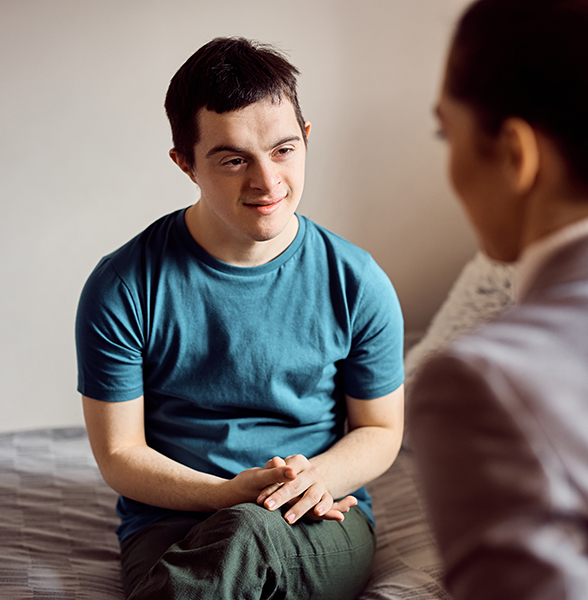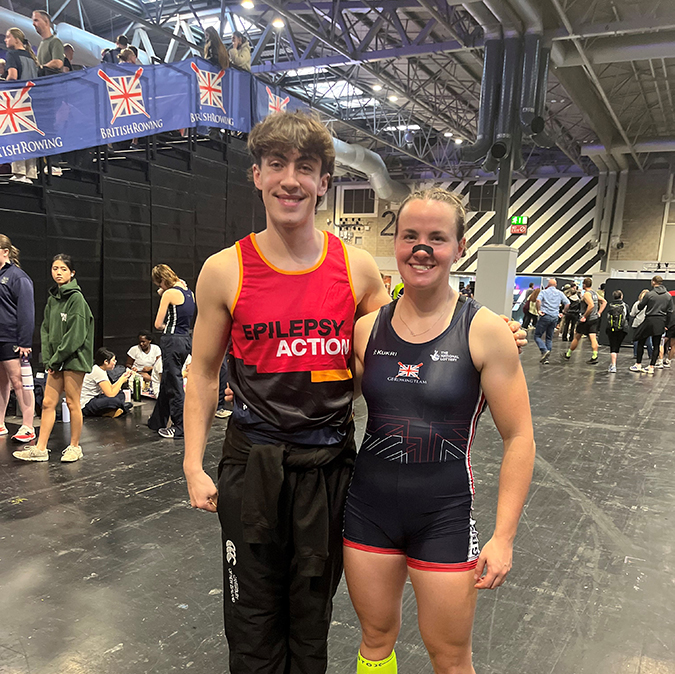From terrifying seizures to thoughtless remarks, Hayley’s mum and dad describe their experience having Hayley’s epilepsy diagnosed
Hayley, 30, from Staffordshire, has had epilepsy almost all her life. Her parents recall what it was like to have their baby daughter diagnosed with epilepsy.
DAD: Hayley was nine months old when her seizures started. It started with a twitch, the slightest of tremors in her hand, barely perceptible. The twitching became more pronounced and moved to the left side of her face and into her left arm. Hayley and I were very lucky as her mum was – and still is – an excellent nurse. As we moved through the NHS, we had a rock who could explain the things I didn’t understand and who was always by her side no matter what.
So, we started down the road. ‘Febrile convulsions’ was the first thing I heard, quickly dismissed, as she didn’t always have a high temperature. So, on to child neurology. It was possibly one of the worst days for me, my baby, wearing a nappy, twitching in my arm. Two doctors telling me it was “fascinating” and they had never seen anything like it. Not what I wanted to hear!
Upon advice of a colleague and friend, when the next seizure happened, we jumped in the car and headed for Birmingham Children’s Hospital. I don’t know how long it took, but we got there and saw the consultant neurologist, a man who was describing her symptoms like he knew what he was talking about. It felt comforting that someone was helping.
MUM: I felt relieved to have a diagnosis, but frustrated that she had to suffer for months before any treatment started. I also felt sad that I couldn’t make it better for my child, and guilty – was it something I had done during the pregnancy? I was angry as well. Angry that local medics were so thoughtless. They stood at the bottom of her cot, watching her have these seizures, saying it was “fascinating” and talking about Jacksonian seizures. As a nurse, I knew they could happen in people with brain tumours. When I asked if they were going to do an urgent scan, I was told if it was a long time to wait for the appointment, then I had to chase it up myself as I worked for the hospital. Terrified doesn’t begin to explain how I felt.
How did we manage? It was trial and error, many different drug changes, many hospital admissions and a childhood lost.
DAD: Most of our relatives were unaware of exactly what Hayley went through. They saw very little of her seizures, they just knew she was just off to hospital. It always amazed me how quickly she recovered after treatment. I would leave to go get her big brother and she would be out of it by the time I was back. Eight hours of sleep later and she would be racing round, towing a drip stand, with not a care in the world.
It all changed with her first grand mal [now known as tonic-clonic] seizure when she was 16 at a family gathering. That frightened a lot of people that day, myself included.
MUM: There was ignorance from many. One person said “you wouldn’t think she wasn’t normal”. We were told, after a particularly worrying admission, when she went into non-convulsive status epilepticus, that if she had died it “would have been God’s will”. Hayley was bullied by children and teachers, and abused by strangers when she has had seizures in the street, as people wrongly assume she is drunk or on drugs. My daughter has suffered for 30 years, and it has been difficult at times, but no matter how bad things have got she always said: “Don’t worry, mum, there are others out there worse off than me.”
DAD: One thing I’d tell other parents in our position is that there is help out there. The front line of the NHS is stretched very thin. However the talent and care of the doctors and nurses is fantastic and there is someone there that will help you, you just have to keep looking.
MUM: One thing I’d tell another parent is to keep fighting for your child to get a specialist neurologist. Ask questions no matter how silly they may seem. Take every opportunity to raise the profile of epilepsy.
DAD: Take all the positives you can when they are well and hold tight to each other when they are not.
MUM: Above all, love your child for who they are, not the diagnosis they have been given.
HAYLEY: Epilepsy was the hand I was dealt and I adjusted over time. But I couldn’t have been prepared for what this would mean for me growing up. Epilepsy ruined the dreams I created and wanted for myself and that isn’t something I was okay with. And, if I’m honest, I don’t think I will ever be okay with that.
I have received some of the worst experiences of my life due to this. I have been bullied, beaten, abused, discriminated against and made to feel like I’m less of a person and that I don’t matter all because of a condition. But these experiences have made me strong and brave and knowledgeable enough to help others.
My loved ones for the most part have been so strong and so supportive. My parents and my siblings especially. My mum and dad were my everything and I owe them my life many times over as without them I wouldn’t be here today. They were my strength when I was too young to have any, they always encouraged me to fight when I was too weak to and they always loved me no matter how bad things got. My brother and sister didn’t always understand why I was poorly but they always knew how to reach me and they both knew if they saw me smile that things would be ok. Sadly not everyone was this supportive. Some members of my family got very afraid to be around me and kept their distance after they saw me have a seizure.
The key thing is to remember you have epilepsy, it doesn’t have you. Feel what you need to, listen to your head and heart and speak up if something doesn’t feel right, or your triggers change, or something feels off. You are special, you are valid and having epilepsy can’t diminish that.
Hayley and her parents are just a few of the thousands of people who know that epilepsy is so much more than seizures. Isolation, fear and a lack of independence are just some of the things so many people with epilepsy feel every day. This Purple Day, there are thousands of people like Hayley who need your help.
Here’s how you can make a difference this Purple Day.
Listen to EpilepsyCast
Regular audio updates from the people leading the conversation around epilepsy.
More articles



Want more articles like this?
Become a member today and receive Epilepsy Today packed with further information.




